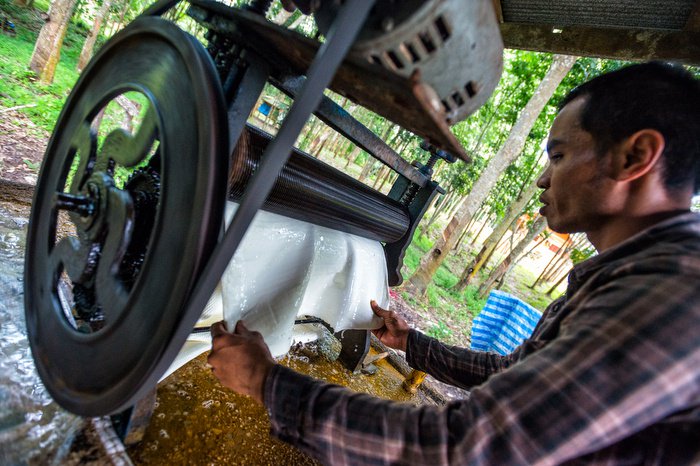Keep it Green: Haunted by silence of the leaves

PHUKET: Anyone who travels around Phuket will have witnessed the infiltration of the oil palm as the area devoted to this species has increased three-fold since 2000.
Moreover, it is the avowed aim of the government to add 400,000 rai of oil palm plantations every year to our island landscape. By 2028, the authorities anticipate that 10 million rai of these man-made forests will dominate the scenery of Southern Thailand .
To a significant extent, the oil palm will replace the para rubber tree, another monoculture crop, since the profits that accrue from its oil are both more substantial and less subject to wild fluctuations than those made from cultivating hevea brasiliensis.
Why and wherefore? Well, we all know that the world, at least until the recent rash of fracking, was paranoid about the fast-depleting resources of fossil fuel and especially petroleum. How much longer could we drill and delve into the earth before the supply of this precious stuff petered out?
Vegetable alternatives such as palm oil were at hand. Converted into bio-diesel, they offered and still offer, a viable and supposedly more environmentally friendly alternative to the products of drilling and mining. Moreover, palm oil especially, has other important uses. It is so ubiquitous that it is found in about half the products on supermarket shelves.
But there are considerable ecological downsides. The increase of palm plantations – a three-fold increase in fifteen years across Southern Thailand and especially Phang Nga – has inevitably meant the depletion of lowland rainforest. While proponents of this initiative will point, quite properly, to the palm’s propensity – as with all trees – to act as a carbon sink and absorb large quantities of CO2, as well as limiting soil erosion, it has meant the demolition of virgin forest, profound damage to the natural environment, and massive loss of biodiversity.
While I have no statistics for Thailand, still fewer for Phuket, the figures for Malaysia assert that of the nation’s 80 mammal species, only 11 are able to survive in the artificial environment of the palm plantation.
In Indonesia, sophisticated creatures such as orang-utangs, cannot adapt to such radical changes in their habitat, and become easy prey for poachers who hunt them for food, the pet trade and so-called traditional medicine. The Sumatran tiger and Javan rhino, natives of countries where vast tracts of tropical forest have been cleared, are now endangered on account of habitat deprivation.
There are perceived ways of mitigating the damage. One study has suggested that supermarkets could place a price premium on items containing palm oil ingredients, provided the money raised went to forest conservation. Thus, if shoppers, who are apparently willing to pay for “conservation grade” palm oil, put their money where their mouth is, and if supermarket chiefs agreed to play ball, then the cash saved would more than make up for the extra costs incurred when conserving nearby forests.
Other suggestions include cultivating oil palms only on land formerly used for other crops such as rubber or rice, or preserving the jungle habitats of animals by locating plantations well away from existing rainforest.
Hevea braziliensis does not have quite such a bad track record as elaeis guineensis. True, in Phuket at least, it is far more visible where unbroken avenues of rubber trees stretch away from every roadside.
Originally imported as seeds from Brazil by way of London , the trees have been cultivated here since 1900 or so. More than a century on, they comprise a staggering 84 per cent of the existing woodland; aboriginal evergreen forest accounts for a mere 7 per cent. Of the total land area of Phuket, more than a 100,000 rai is rubber plantation.
Yet though Thailand retains its position as the world’s leading producer, there is no longer the same demand for rubber. True, the Aids epidemic stimulated –if that be the right word – a global appetite for latex condoms – but most rubber has long since been synthesized without any need for the arduous business of cutting and collecting the milky fluid from incisions in the bark of living trees.
Furthermore, and because these trees have been a palpable presence in Phuket for so long, we tend to forget that their cultivation muscled out both virgin forest and its wildlife, or that they possess the disadvantage, shared by all monoculture crops, that of providing a sterile environment for mammals and birds. And because they attract pests such as scale insects, they require massive doses of pesticide as well as chemical fertilizer to keep them healthy.
Ever walked through a gloomy rubber grove? It is eerily silent.
Dr.Patrick Campbell has written more than 300 gardening columns for the Phuket Gazette. In the newspaper’s revised format, he will contribute one monthly piece on gardening and another on environmental issues.
If you have a question or a garden that you would like to see featured, email Patrick at drpaccampbell@gmail.com. Many of his past articles and his academic and creative publications can be accessed at patrickaccampbell.wordpress.com.
— Patrick Campbell
Latest Thailand News
Follow The Thaiger on Google News:


























